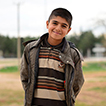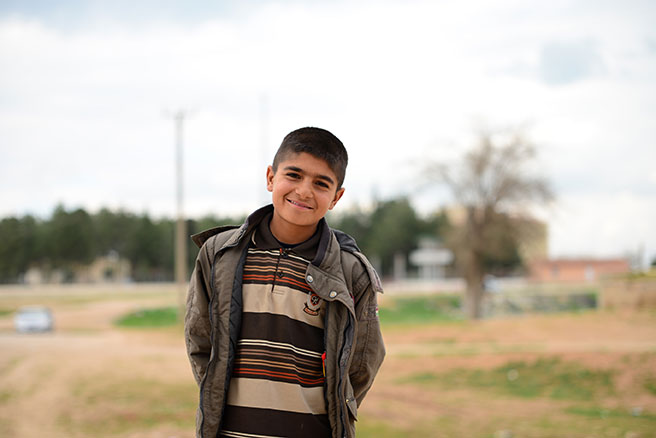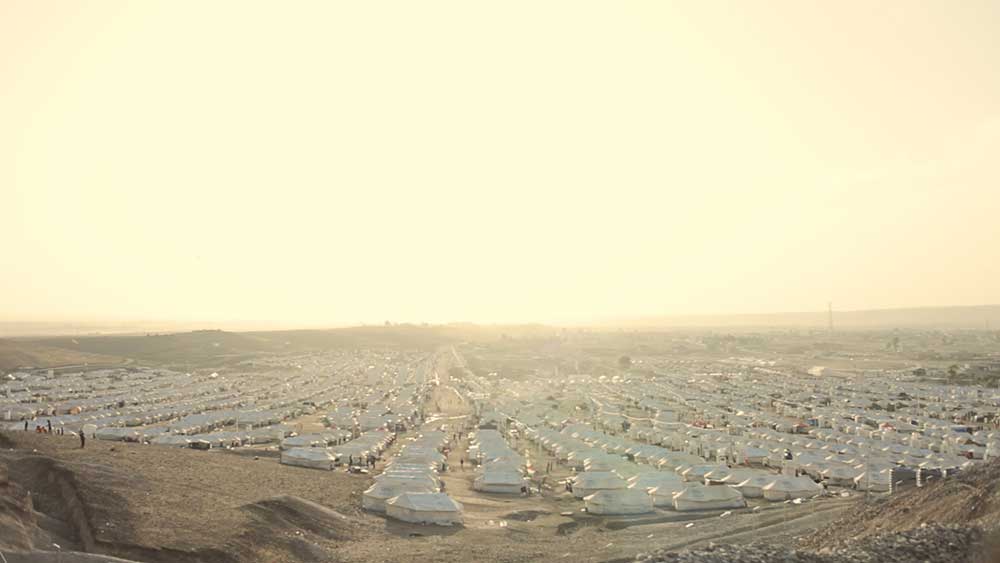The Syrian Refugee Crisis
In Their Own Words

“Do not let your thoughts for this region be hopeless. I have been estranged, but no one has cared to asked me, ‘What’s wrong?’ Is this the end of my dream? I wish we had all died in Syria. We came here and entered hell. In Europe they have animal rights. Here we do not have human rights. I consider everyone’s situation, but I also want people to consider our situation.”
One day while visiting a kindergarten for refugee children, I noticed a boy in the corner of the playground putting his hand into the sand and bringing it out, slowly, again and again. I sat down beside him and showed him pictures of my grandchildren who were about his age. I asked him his name. “Mohammed.” I asked him what he was doing with his hand. He said, “I am thinking about what they did to my Baba.” The teacher who was  sitting with us said, “John, we think the regime made him watch as they buried his father alive.” The boy read the reaction on my face. I was sad and shocked and was shaking my head in disbelief. Then the boy stood up and looked like a little superhero. He put his little hand on my shoulder and said, “It’s ok Abuna, don’t cry for me. When I grow up I am going to be a jet fighter pilot and I will bomb them all.”
sitting with us said, “John, we think the regime made him watch as they buried his father alive.” The boy read the reaction on my face. I was sad and shocked and was shaking my head in disbelief. Then the boy stood up and looked like a little superhero. He put his little hand on my shoulder and said, “It’s ok Abuna, don’t cry for me. When I grow up I am going to be a jet fighter pilot and I will bomb them all.”
On another occasion our team packed up our vehicles and drove to a village outside Amman on a distribution for refugee families. Food, hygiene packets, toys, stuffed animals, reading glasses, blankets, stoves, etc. We set up a stage to have a puppet show, tell stories of Jesus, and teach the children praise songs. After listening for some time, a boy in the front raised his hand and said, “You are all lying to us. We don’t feel God’s love. We have all been broken.”
Throughout the Middle East the terrorists are the new superheroes. The narrative is that shame and humiliation are cleansed through violence. This is the narrative most children are hearing at home and this is the narrative being pushed by the Islamic State through social media. Sadly, this narrative is connecting on an emotional level with tens of thousands of refugee children and teenagers. Only Jesus can interrupt the cycle of violence. Experiencing his love and forgiveness makes it possible for us to forgive others. When we share the stories of Jesus, combined with practical demonstrations of kindness, supported by persistent, prevailing prayer, Jesus himself, the Savior and Healer of the broken, comes.
A refugee walked by a church and saw a sign that said: “Jesus—the light of the world.” He went inside and told someone, “All around me is darkness. You don’t understand my situation. If you want to understand my situation you must come to see my home.” So Yusuf, the man from the church, went with him. They arrived at an underground room with no windows and a dirt floor. Seven people were in the room including a young man lying on the ground. He had not moved for four months. The Syrian army had beaten him and broken his back. The family had walked three days through the desert to escape Syria, carrying this brother. They spent all their money along the way and arrived at the border with nothing. At that time the church had nothing left from the supply room to give. “I have nothing left to give you,” Yusuf said, “but I will ask God to help you and to help me help you.” Yusuf prayed and then he left. One hour later the man telephoned Yusuf, “After you prayed,” he said, “for the first time in four months, my brother felt something in his leg—like a fire starting in his foot and going to his fingers.” The pastor went that same day with Yusuf to meet this family. When the pastor saw the young man lying on the floor he asked him what his job had been in Syria.  The young man was a mechanic. So the pastor asked him, “If a car has an accident, do they first bring it to you or to the body shop?” “They bring it to me first.” And the pastor said, “This is what God does, too, through Jesus Christ. Do you believe this?” And all the family said, “Yes, we are serious, we want this, we want God to fix our hearts by Jesus Christ and then our bodies, too.” The pastor said, “Jesus Christ is able to heal you because he is God and he has all the power. And he is able to fix your hearts and make you right with him.” So the family prayed to accept Jesus.
The young man was a mechanic. So the pastor asked him, “If a car has an accident, do they first bring it to you or to the body shop?” “They bring it to me first.” And the pastor said, “This is what God does, too, through Jesus Christ. Do you believe this?” And all the family said, “Yes, we are serious, we want this, we want God to fix our hearts by Jesus Christ and then our bodies, too.” The pastor said, “Jesus Christ is able to heal you because he is God and he has all the power. And he is able to fix your hearts and make you right with him.” So the family prayed to accept Jesus.
Nothing happened at that time to the body of the brother on the floor. But five days later the other brother came to the church. This was unusual; Muslims rarely want to worship with Christians. This man came to the church and took a seat in the front. When the pastor asked who had prayer requests, this man stood up and said, “I want to ask you to keep praying for my brother. And I want to thank you for visiting him because this made him smile and now he has hope. Then the pastor asked people to stand and pray for this. While they were praying, the man’s cell phone rang. It was the sick brother. “I feel the fire right now in the other leg. From this moment, we will all follow.” This was five months ago and now the young brother is 90% healed and is walking without the use of a cane. A weekly Discovery Bible Study (DBS) now meets in their home.
A young missionary reports, “We pray, inviting the Holy Spirit to work in their lives, and he touches them. The families come to depend on praying with us each week. So do we! This is a lot of fun for us! One man gathers his entire family and invites his friends to our prayer times. He says they have an intimacy with God they never had before. He had a vision in which a great light came to him, and a voice said, “A great sign is coming to you. This sign needs to be shared all over the world with every person.” The next day I decided to bring him a Bible. I brought the Bible in a grocery bag. I said, “The great sign is here in this bag. This book tells about our Lord, his sacrifice and his resurrection and why we need it.” He said, “OK, this is it. I believe it. He died for my sins.” His wife became very upset. So we brought a Sheik who follows Jesus to meet with her. He helped her see from the Qur’an how they need to read the Bible, and that it is not corrupt, and that Jesus is the pinnacle of the Qur’an, and how all the prophets were pointing to Jesus. Now she and the oldest son are reading the Bible. We need more laborers who will consistently go to these homes to help these people and pray with them. This builds trust. We find that 8-10 visits are needed to build this trust. Frankly there are a lot of workers here but not so many that are consistently visiting. We must sow a lot and this takes time and can be discouraging. We see a lot of burnout. Pray for us. We have to give the burdens of this work to God.









comments